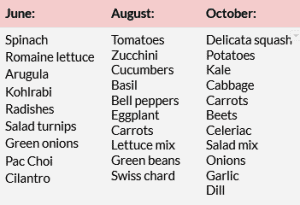Frequently Asked Questions
Community Supported Agriculture (CSA)
The regular-size CSA baskets contain 7-11 items, and the large size contains 9-13 items depending on the season.
The weekly, regular CSA is generally the right amount for a small family (2 adults, 1-2 kids) or two vegetable-loving adults. The large size is a great fit for larger families or those with a vegetable-heavy diet.
The bi-weekly regular share is normally a good fit for two omnivores who don’t cook every night or one veggie-loving adult.
Weekly shares guarantee freshness and first access to seasonal crops, while biweekly shares reduce trips to the pickup location.
Each regular box contains 7 to 11 different vegetables, while a large box has 9-13 vegetables.
The contents of the box change throughout the seasons. Here are examples of what you might find in a regular spring, summer, and fall box.
Easy. Our CSA program allows you to skip as many weeks as you like.
Every week you skip generates farm bucks — online store credit — that can be used to purchase another CSA box or seasonal vegetables.
Farm Bucks do not roll over to the following year, so you must ensure that you use them up before the season is over.
Skipped weeks are managed online through your heartbeetfarm.ca account. Log in to your account and select the week you wish to skip at least 72 hours before the start of the pickup window.
If you can’t pick up your vegetables and know 72 hours in advance, log in to your heartbeetfarm.ca account and skip that week. That will give you farm bucks to use in the future.
When life happens, and you forget to pick up your share, it will be donated to our foodbank partner. Refunds aren’t provided for unclaimed boxes.
The accessibility fund helps low-income individuals and families access fresh, high-quality, organically-grown vegetables. 2% of every CSA share purchased is allocated to the accessibility fund.
Curious about no-cost or low-cost options? Visit our accessibility fund page to learn more.
Every box will be different as the season progresses. Here are examples of what you might find in a regular-sized spring, summer, and fall box.

Yes! We have been fully certified organic since July of 2024. We are certified organic by Eco-Cert.
Our focus has always been on growing beautiful produce for our CSA members and customers by strictly following the Canadian Organic Standards and sticking to Regenerative Principles as much as possible.
Specifically, our production practices include the following:
- Rotating crop families from field to field, year after year
- Sowing cover crops to build soil, break pest cycles, and suppress weeds
- Using specialized insect netting to reduce pest pressure
- Using row covers as protection from early/late frosts
- Growing crops in soil and under tunnels to extend the season and reduce disease pressure
- Fertilizing with certified organic amendments only
- Spraying with only organic-approved formulas that do not harm beneficial insects or pollinators
You can swap it out at the pickup! There will be a swap box full of extras at every pickup to allow you to swap out a vegetable you don't like in your share for something you love.
We’re here to help you turn those strange-looking vegetables into a mouth-watering dish!
Ask us for ideas when you pick up your share. Also, make sure to read our weekly newsletter for fantastic recipes to use those less common veggies along with storage requirements and a brief description. Often our recipes include two or three of the vegetables on offer that week.
We’re also in the process of compiling all of the recipes we have sent out over the last four years so that CSA members can access all of them through the website.
Yes. Before June 15, 2026, program cancellations will be eligible for a full refund minus a $35 administrative fee and the credit card processing fee (approx. 3%)
Program cancellations after June 15, 2026, cannot be refunded. Heartbeet Farm will have spent most of the funds to buy supplies and pay wages for crops that were started as early as February.
Members are encouraged to find a replacement member and collect payment from that person. We cannot guarantee assistance in finding a replacement as we are very busy with production and harvest at this time of year.
